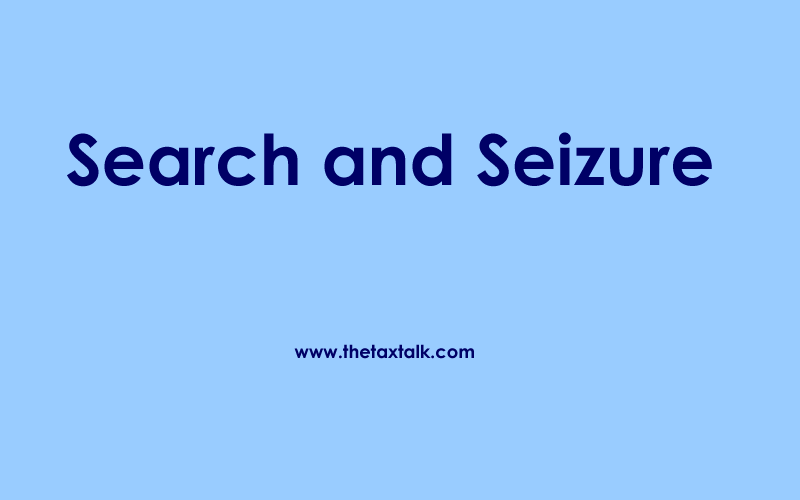![]()
Search and Seizure
To define the word RAID I can say it is a rapid surprise attack on an assessee by the Income Tax Department which is horrifying and terrible for that person. The word Raid, is normally used by common people but the law terms this word as “SEARCH AND SEIZURE”. The questions that may flow in the mind of the individual are discussed below.
WHO CAN AUTHORISE SEARCH AND SEIZURE?
To authorise Search and Seizure a search warrant is issued by income tax department by Director General or Director or Chief Commissioner or Commissioner and also by such Additional Director or Additional Commissioner or Joint Director or Joint Commissioner as may be empowered by CBDT.
WHEN CAN IT BE AUTHORISED?
It can basically be authorised by the above authorities if as per the information they possess they have the reasons to believe that the person who is required to produce books of account or other documents under section 131 or section 142(1) failed to do that or may fail to do that or if any notice will be issued to him he will not produce the documents. Also if the authority thinks that a person possesses any asset which is not disclosed by him search warrant can be issued against him.
The best part of this is that the Assessing Officer NEED NOT disclose the reasons to believe for conducting such search even after completion of Search. He just needs to record it with himself.
WHAT ARE THE POWERS OF AUTHORISED OFFICER?
- To enter and search any building, place, vessel, vehicle or aircraft, where he has reason to subject that such books of accounts, other documents, money, bullion, jewellery or other valuable article or thing are kept.
- To break open the lock of any door, box, locker, safe, almirah or other receptacle, if the keys are not available.
- To search any person who has got out of, or is about to get into, or is in the searched building, place, vessel, vehicle, aircraft if he has reason to suspect that the assessee has secreted any books of accounts, documents, money, bullion, jewellery, valuable article or thing.
- To seize any books of accounts, documents, money, bullion, jewellery, valuable article or thing.
- To place marks of identification on books of accounts or other documents.
- To make or cause to be made copies or extracts from books of accounts or other documents.
- To make a note or an inventory of any such money, bullion, jewellery or other valuable article or thing.
- To administer on oath and record statements.
- To require any person who is found to be in possession or control of any books of accounts or other documents maintained in the form of electronic record, to afford the authorized officer the necessary facility to inspect such books of accounts and other documents.
WHAT IF SEARCH IS ALREADY CONDUCTED UNDER OTHER LAW?
In case search is already conducted under any other law example FEMA, Custom etc. and the assets have been seized by them than the assessing officer may make requisition to authority under any other law to deliver the books of accounts and assets seized as early as possible.
CAN WE DEMAND BACK THE SEIZED ASSET?
The seized asset will be applied in the following manner:
- Towards the payment of existing liability under Income Tax Act.
- Towards the payment of liability demanded after completion of Search
- Towards the payment of liability arising in case application is made before settlement commissioner
- The assets after clearing all the liabilities including tax, fees, penalties etc will be given back to assessee.
[button color=”” size=”” type=”round” target=”” link=”https://thetaxtalk.com/”]Home[/button] [button color=”” size=”” type=”round” target=”” link=”https://thetaxtalk.com/submit-article-publish-your-articles-here/”]Submit Article [/button] [button color=”” size=”” type=”round” target=”” link=”https://thetaxtalk.com/discussion-on-tax-problem/”]Ask Question [/button]


